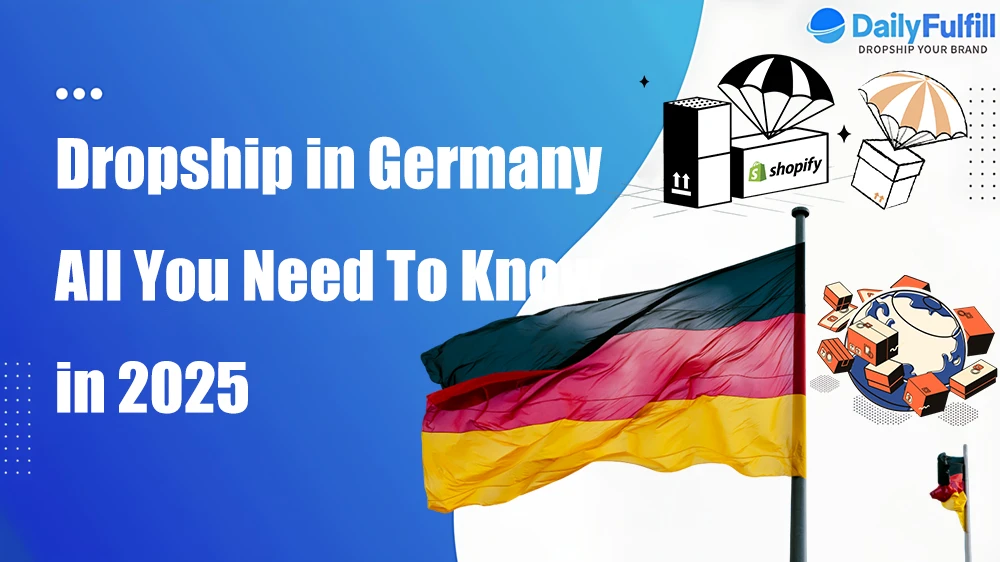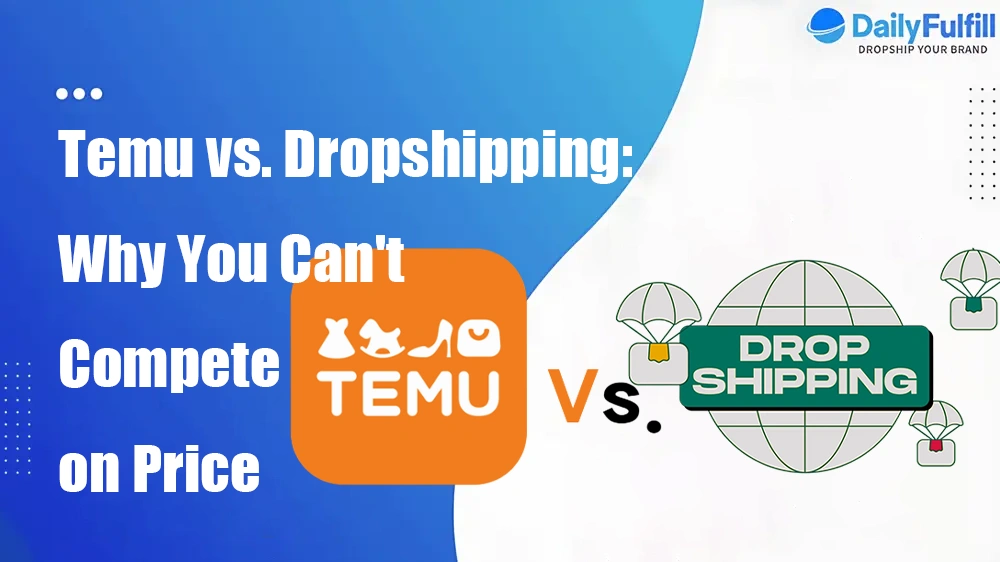
Dropship in Germany : All you need to Know in 2025

Germany is one of Europe’s strongest eCommerce markets, driven by high purchasing power, strict consumer expectations, and a fast-growing online shopping culture. For dropshippers, it’s a market full of opportunity—if you understand how to operate the right way.
In this post, DailyFulfill show everything you need to know dropship in Germany 2025: local regulations, customer preferences, top product ideas, shipping options, and proven strategies to scale.
If you’re planning to enter Germany or expand your current store, this guide gives you a clear and reliable starting point.
Dropshipping Business Legality
Legal Status
You can run a Dropshipping Business in Germany if you follow the legal requirements. You must register your business, pay VAT, and join the Chamber of Industry and Commerce (IHK). If you are not from the EU, you need a valid work permit for self-employment. Student visas do not qualify for business registration.
Here is a table that shows the main legal requirements for starting your Dropshipping Business in Germany:
Requirement | Description |
|---|---|
Business Registration | Submit a completed form to the trade office or regulatory office. |
Personal Document | Provide a valid personal document or residence permit. |
Additional Documents | Companies need a commercial register excerpt; legal entities need notarized articles and shareholder consent. |
Official Approvals | Some activities require official permission or approval certificates. |
Chamber Membership | Join the Chamber of Industry and Commerce; pay an annual fee based on revenue. |
Tip: You must register your business before you start selling. If you skip registration, you risk fines and legal trouble. You can register your business retroactively, but it is better to do it from the start.
If you operate a Dropshipping Business without proper registration, you face several consequences:
You break commercial trade laws.
You risk fines and penalties.
You may lose the right to run your business.
Profitability
You can earn good profits with a Dropshipping Business in Germany. Most sellers see profit margins between 10% and 30%. Some reach even higher margins, up to 30%. Many dropshipping stores in Germany report average profit margins between 15% and 20%. These numbers show that dropshipping can be a profitable choice.
Germany offers strong consumer spending power and a large e-commerce market. You face less competition than in the UK, where marketing costs are higher. France has moderate competition and high consumer spending, while Spain has fewer competitors but faces language challenges. Germany stands out because its e-commerce market is the largest in Europe. You benefit from high sales and strong market demand.
Note: You can increase your profits by choosing products with high demand and low competition. Focus on quality suppliers and reliable fulfillment to keep your customers happy.
You must follow all legal steps to protect your business and boost your chances of success. When you meet the requirements and understand the market, you build a Dropshipping Business that can grow and thrive in Germany.
Market Overview
Trends
You see many changes in the German dropshipping market. Companies now focus on eco-friendly products, smart home devices, and health and wellness items. These trends show that buyers want more specialized products. Many businesses use new technology like AI and chatbots to improve customer service and order processing. You also notice that big e-commerce companies and startups compete by using these tools. Urban areas lead in dropshipping, but smaller cities grow fast because of better delivery systems. The table below shows the main trends shaping the market:
Trend Category | Description |
|---|---|
Segment Diversification & Niche Expansion | Focus on eco-friendly products, smart home devices, and health & wellness items reflects consumer demand for specialized offerings. |
Competitive Landscape & Technological Leadership | Major players include e-commerce giants and startups using AI-driven innovations, intensifying competition. |
Adoption Challenges & Regulatory Shifts | Platforms face challenges related to GDPR compliance and consumer protection, requiring robust frameworks. |
Future Opportunities & Market Penetration Strategies | Opportunities include AR for shopping experiences and localized marketing strategies. |
Application Developments & Innovation Breakthroughs | Innovations like AI chatbots and blockchain enhance operational efficiency and customer trust. |
Regional Growth & Performance Dynamics | Urban centers lead in adoption, but smaller cities are growing due to improved logistics infrastructure. |
Consumer Preferences
German shoppers care about quality and safety. They prefer sustainable products and often pay more for items made from recycled materials. You will notice that buyers research products carefully before making a purchase. Most people choose to pay by invoice, and many like cash on delivery for extra security. Fast and reliable home delivery is very important. More people now shop on their phones, especially for small items. Cross-border shopping is slowly growing, with buyers open to affordable products from other countries.
Sustainable products matter most.
Buyers research before buying.
Invoice is the top payment method.
Home delivery is the favorite option.
Mobile shopping is rising.
Cross-border shopping is increasing.
Popular Niches
You can find success in several product categories. Pet supplies sell well because many Germans own pets. Home office products are popular as more people work from home. Fitness and workout gear see high demand after the pandemic. Clothing sales keep rising, and kitchen tools remain essential for daily life. Eco-friendly products attract buyers who care about the environment. The table below lists the top niches for your Dropshipping Business:
Niche | Description |
|---|---|
Pet Supplies | High demand due to a significant percentage of pet owners in Germany. |
Home Office | Increased demand for home office supplies as remote work becomes more common. |
Fitness and Workout | Rising interest in home fitness solutions post-pandemic. |
Clothing | Clothing market revenue has increased significantly, indicating strong potential for dropshipping. |
Kitchen Tools | Essential items with consistent demand due to their necessity in daily life. |
Eco-Friendly | Growing consumer awareness and demand for sustainable products. |
Legal Requirements
Registration
You must register your business before you start selling in Germany. The process is clear and follows these steps:
Set up your online store with legal compliance. Your website needs an Impressum, a privacy policy that follows GDPR, cookie consent, and clear return and cancellation policies. All information must appear in German.
Register your business with the local trade office (Gewerbeamt). This step is required even if you live outside Germany but target German customers.
Manage your VAT obligations. If you sell to customers in the EU, you may use the One-Stop-Shop (OSS) for VAT reporting.
Register for VAT if your annual turnover exceeds €25,000 for domestic sales or €10,000 for cross-border sales.
Tip: Registering your business early helps you avoid fines and keeps your Dropshipping Business legal from the start.
VAT
You must understand VAT rules when you run a Dropshipping Business in Germany. Since July 2021, all imported products into the EU face import VAT. The old rule that allowed items under €22 to enter without VAT no longer applies. You can use the Import-One-Stop-Shop (IOSS) to make import reporting easier. Usually, the customer acts as the importer and pays customs duties and import VAT. You must tell your customers about these costs during checkout.
IHK Membership
You must join the Chamber of Industry and Commerce (IHK) if you operate a business in Germany. This rule covers all business owners, legal entities, and partnerships that pay local business tax and have business premises in the IHK district.
You pay a subscription fee for IHK membership.
If your business is not in the commercial register and your annual profit stays below €5,200, you do not pay the fee.
Note: IHK membership is not optional. It is a legal requirement for every business owner in Germany.
Work Permit
If you are not from the EU, you need a work permit for self-employment in Germany. The table below shows the main requirements:
Requirement | Details |
|---|---|
Economic Interest | Your business must meet an economic need or regional demand. |
Positive Economic Effects | Your business should help the local economy. |
Financing | You must show you have enough money or a loan to support your business. |
Age Requirement | If you are over 45, you must prove you have a retirement plan. |
Required Documents | You need a valid passport, proof of where you live, proof of funds, and a solid business plan. |
Consumer Protection
German law protects consumers who shop online. You must follow these rules:
Consumer Protection Aspect | Details |
|---|---|
Right of Cancellation | Customers can cancel their order within 14 days for most physical goods. |
Return Policy | You must clearly explain your cancellation and return policy. |
Warranty | Customers get a 2-year warranty against defects under the German Sale of Goods Act (BGB). |
Return Postage Limit | You cannot charge more than €40 for return postage. |
You must inform customers about their right of cancellation in writing.
If you do not provide correct information, the cancellation period may last longer.
You should offer a return address within the EU to make returns easier for your customers.
Packaging Laws
You must follow the German Packaging Act (VerpackG) if you ship products to customers in Germany. Your responsibilities depend on your location:
Shipper Location | Responsibilities |
|---|---|
Based in Germany | You are the manufacturer. You must handle all product and shipping packaging requirements. |
Based abroad (e.g., AliExpress) | If you act as the importer, you must pay license fees, register with LUCID, and list your brand names. |
Alert: Not following VerpackG rules can lead to fines. Always register with LUCID and keep your packaging records up to date.
Website Compliance
Your website must meet strict legal standards in Germany. The table below lists the main requirements:
Requirement | Description |
|---|---|
Name and Legal Form | Show your full name or company name and legal form (like GmbH or AG). |
Physical Address | List your complete business address. |
Contact Details | Give an email address and, if possible, a phone number. |
Registration Information | Include your commercial register number and registration court if registered. |
VAT or Tax ID | Display your VAT identification number or other tax details if needed. |
Responsible Person | Name the person legally responsible for your website content. |
Additional Disclosures | Add any extra legal disclaimers or licenses your business needs. |
Privacy Policy | Provide a privacy policy that explains how you collect and use data, following DSGVO rules. |
Tip: Your Impressum and privacy policy must be easy to find and written in German. This keeps your Dropshipping Business safe from legal complaints.
Suppliers and Tools
Top Suppliers
Choosing the right suppliers is key for your Dropshipping Business. Reliable suppliers help you avoid delivery problems and unhappy customers. In Germany, you can work with well-known suppliers like BrandsGateway, buXtrade, Dropshipping Marktplatz, and Shein. Many businesses also use suppliers with high ratings for reliability. The table below shows some of the most trusted suppliers and their ratings:
Supplier | Rating |
|---|---|
Hertwill | 4.7/5.0 |
MarketPrint | 4.7/5.0 |
BrandsGateway | 4.6/5.0 |
Droppery | 4.6/5.0 |
Syncee | 4.5/5.0 |
Spocket | 4.4/5.0 |
SaleHoo | 3.8/5.0 |

Tip: Always check supplier ratings and reviews before you add them to your store.
Platforms
You need a strong platform to run your online store. Shopify is a top choice for many in Germany because it is easy to use and supports German language and tax rules. Other popular platforms include OTTO, Spartoo, Newegg, Sears, Rakuten, Zalando, and AboutYou. Each platform offers different features, fees, and market sizes. The table below helps you compare them:
Platform | Fees | Market Size | Monthly Subscription | Main Features |
|---|---|---|---|---|
OTTO | 7-20% | 16 billion | €39.90 | Fulfillment options, advertising, German translations. |
Spartoo | 15-20% | 450 million | Starts at £14.99 | Free delivery, active in 19 countries. |
Newegg | 8-12% | 39.6 million | None | Fulfillment, marketing, low commission for international sellers. |
Sears | 8-17% | 30+ million | $39.99 | Fulfillment, customer support, pay-as-you-go pricing. |
Rakuten | 8-12% | 105 million | ~$170 | Fulfillment, advertising, customizable stores. |
Zalando | N/A | N/A | N/A | Focus on fashion, free shipping & returns. |
AboutYou | N/A | N/A | N/A | Personalized shopping, influencer partnerships, mobile-first. |

Note: Shopify is a great starting point if you want a platform tailored for Germany.
Payment Solutions
You must offer secure and flexible payment options to build trust with your customers. The most popular payment solutions for dropshipping in Germany include:
PayPal: Fast and secure online payments.
Fondy: Supports many payment methods and keeps transactions safe.
Worldline: Offers payment solutions for online and in-store sales.
Adyen: Handles payments across many channels with strong security.
Klarna: Lets customers buy now and pay later.
Customers in Germany often prefer to pay by invoice or use trusted payment gateways.
Automation Tools
Automation tools help you save time and avoid mistakes. You can use vendor management systems to track suppliers and inventory. Product tracking tools monitor sales and stock levels. Website builders pull product data from suppliers and update your store automatically. Other tools offer real-time inventory updates, automate order processing, and give you analytics for better decisions. These tools help you grow your business and keep operations smooth.
Vendor management: Track products and suppliers.
Product tracking: Monitor sales and inventory changes.
Website building: Create stores and sync product data.
Real-time inventory: Prevent overselling.
Order automation: Route orders to suppliers quickly.
Analytics: Make smart business choices.
Using automation tools lets you focus on growing your Dropshipping Business instead of handling manual tasks.
Starting a Dropshipping Business
Research
You start by learning what German customers want. Use market research to find out which products are popular. Look at what your competitors sell and see which items get the most attention. Try these methods:
Study consumer preferences to spot trends.
Use keyword research tools to find high-demand products.
Check out product research tools like Sell The Trend or AliExpress Dropshipping Center.
Watch social media for trending items.
Analyze your competitors to learn what works.
Market research helps you discover products that people want but cannot easily find in local stores. This step gives your Dropshipping Business a strong start.
Registration
Register your business before you sell anything. Go to the local trade office and fill out the required forms. Make sure you have all your documents ready. Register for VAT if your sales go above the set limits. Early registration keeps your business legal and avoids fines.
Store Setup
Set up your online store with your target market in mind. Focus on German customers by using the German language and local payment methods like Giropay. Choose a platform such as Shopify, which supports German tax rules. Follow these best practices:
Target a specific market, such as Germany.
Use local payment options.
Work with European suppliers for faster shipping.
Register for the One Stop Shop to handle VAT.
Supplier Integration
Connect your store to reliable suppliers. Platforms like Spocket make this easy. They let you manage product sourcing, inventory, and order tracking in one place. The table below shows key features:
Feature | Description |
|---|---|
Integration | Spocket links with many e-commerce platforms for easy management. |
Automation | AI tools help automate dropshipping tasks. |
Flexibility | No minimum order quantities let you test products without big risks. |
Curated Selection | Access top-selling items from trusted EU suppliers. |
Compliance
Check that your store meets all legal requirements. Add an Impressum and privacy policy in German. Make sure your return and cancellation policies are clear. Register with LUCID for packaging laws. Stay up to date with VAT rules.
Launch
After you finish all steps, launch your store. Promote your products using social media and ads. Track your sales and listen to customer feedback. Keep improving your store to grow your business.
Optimization and Automation
Fulfillment
You need a smooth fulfillment process to keep your customers happy. Fast and reliable shipping builds trust and encourages repeat purchases. Use automation tools to manage orders and inventory. For example, platforms like Spocket and CJdropshipping offer real-time inventory updates and automated order processing. These features help you avoid overselling and ensure that products reach your customers quickly. When you automate fulfillment, you save time and reduce mistakes.
Tip: Choose suppliers with warehouses in Europe for faster delivery to German customers.
Returns
Handling returns correctly is important for your dropshipping business in Germany. Customers have strong rights under German and EU law. You must:
Accept returns and provide clear return policies.
Allow customers to withdraw from a purchase and return products without giving a reason.
Facilitate returns to a European address, even if you sell from outside the EU.
Give customers 14 days after delivery to revoke their purchase.
Never exclude or limit warranty rights.
If you do not follow these rules, you risk losing customer trust and facing legal problems.
Marketing Automation
Marketing automation helps you reach more customers and grow your business. Tools like Syncee, Dropified, Spocket, and CJdropshipping make marketing easier by:
Automating order processing and product imports.
Managing inventory to prevent stockouts.
Sending timely updates to customers.
Providing advanced analytics for better decision-making.
You can also use these tools to set pricing rules and connect with vetted suppliers. Automated customer communication improves the shopping experience and builds loyalty.
Scaling
When your business grows, you need a plan to scale. Follow these steps:
Analyze your sales data and customer feedback.
Optimize your website for faster loading and better product descriptions.
Add new products based on market research.
Invest in marketing campaigns that work best for your audience.
Use third-party logistics to speed up delivery.
Build a strong brand to encourage repeat purchases.
Monitor legal compliance as your business expands.
Winning in Germany’s dropshipping market requires strong product quality, transparent policies, fast delivery, and consistent customer trust. With the right approach, Germany can become one of your most stable and profitable regions in 2025.
DailyFulfill supports global sellers with compliant sourcing, high-quality checks, and efficient fulfillment tailored for the EU, helping your brand compete with confidence. Apply the insights from this guide, stay aligned with local expectations, and build a long-term business that earns repeat customers in Germany.
DailyFulfill is your Best Dropshipping Partner
- 24/7 customer support
- 100% quality guarantee
- 1400+ professional clients
- 8400 m² fulfillment center
- 59960+ Sku of products
- 12+ dropshipping experience
Recent posts
FAQs
You need a valid ID, proof of address, business registration form, and VAT registration if your sales exceed the threshold.
You do not need to speak German, but your website must show legal pages and product information in German.
You must accept returns within 14 days. Offer a return address in the EU.
Explain your return policy clearly
Refund customers quickly
Yes, you can operate from another country. Register your business in Germany and follow local laws.
German shoppers prefer:
Payment Method | Popularity |
|---|---|
Invoice | High |
PayPal | High |
Klarna | Medium |
Credit Card | Medium |


